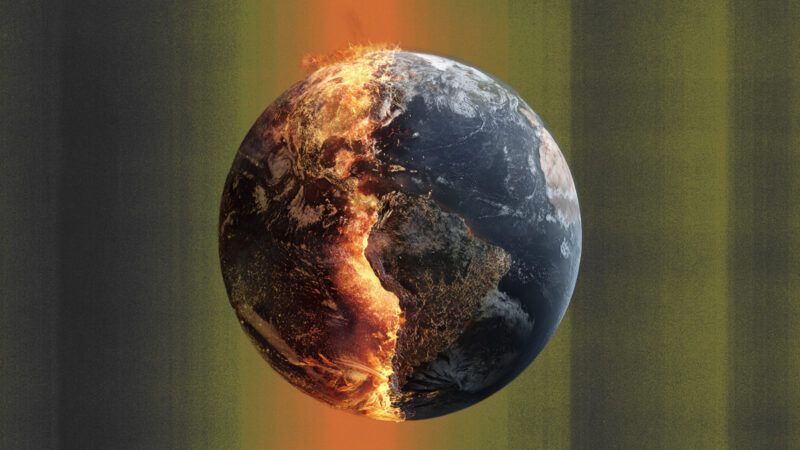The Department of Energy Just Admitted Climate Change May Not Be Catastrophic
A report affirms that greenhouse gases are warming the planet, but it also found no convincing evidence that U.S. hurricanes, tornadoes, floods, or droughts have become more frequent or intense in recent decades.

A new report from the Department of Energy concludes that, yes, the climate is changing and humans contribute to it—but no, it's not necessarily the impending catastrophe we've been warned about. In another era, an agency charting this kind of middle course would be unremarkable. Today, it feels revolutionary.
The debate over climate change and responses has become so polarized that acknowledging the problem of human-driven warming without accepting a narrative that can sound apocalyptic invites attacks from all sides. I understand that the findings are controversial and hope climate scientists debate every detail. Considering the upside of getting this issue right, you would think more people would encourage open debate.
That is exactly what led energy analyst Travis Fisher of the Cato Institute to return briefly to the administration and help organize the Climate Working Group, which generated the report. Like many of us who read from outside our ideological circles, Fisher was frustrated that many members of the left treat climate-crisis dissent as a thought crime, while many on the right still dismiss climate change as a joke.
Fisher was initially hesitant to return to government service after a bruising prior stint. He was won over by Energy Secretary Chris Wright's stated desire to follow the data and inject more hard evidence into the conversation. Wright's plan was simple: "Elevate the debate" by gathering a team of credible, often-overlooked, independent experts to critically review the state of climate science—without political filters—and publish the results openly.
Five scientists were chosen by the energy secretary. They are all highly credentialed and have decades of research under their belts. Importantly, they were given complete freedom over their conclusions. One need not agree with the Trump administration's overall climate policy—such as the dismissal of the 400 volunteer scientists preparing the next congressionally mandated National Climate Assessment—to recognize the legitimacy of this new report and its small group of authors.
What does the report say? In a nutshell, as Fisher puts it: "Climate science—let alone climate policy—is far more nuanced than the summaries for policymakers (produced by previous government efforts) would have you believe."
The report affirms that greenhouse gases are warming the planet but tempers several claims. For example, the authors found no convincing evidence that U.S. hurricanes, tornadoes, floods, or droughts have become more frequent or intense in recent decades, despite what you'd gather from headlines. This debate will continue, as it should, with many related dimensions to consider. But at least there is now high-profile evidence on record to give a say to reasonable experts who disagree with other more alarmed perspectives.
The Department of Energy report's authors also find that the planet's warming is unlikely to cause as much economic damage as is commonly claimed, in part because they believe past projections have been too extreme—something the Intergovernmental Panel on Climate Change and other mainstream climate scientists have recognized in recent years.
Another finding in the report is that drastic policies meant to reduce warming could do more economic harm than good, and that even the most heavy-handed climate policy can't make much of a difference. Even if we eliminated all U.S. emissions, the authors argue, it would have an "undetectably small" effect on global temperatures. Far from denying climate change, this perspective puts it into context and reminds us that sometimes the strongest medicines can hurt more than the disease.
None of this is to say that the report has all the answers or that other more worried scientists should not be heard. That's exactly the point: There should be an ongoing debate. Insisting that "the science is settled" implies that only one narrative is allowed and downplays other important conversations about the effects and scale of the challenge.
So, while some self-styled science defenders try to silence any dissenting view, one of the authors of the new report, Judith Curry of Georgia Tech, rightly notes that "any scientist that isn't skeptical isn't doing their job….The 'mainstream' attempt to enforce a faux consensus to support political objectives is antithetical to science." A healthy process welcomes scrutiny and disagreement, which should help sharpen the work of any conscientious expert.
For better or worse, the study is already having an impact, with the Environmental Protection Agency citing it in a proposal to reconsider the federal government's 2009 finding that greenhouse gases endanger public health and welfare. That will mean legal fights, lots of criticism—and more debate.
This report—the first of many of its kind, I hope—shows that it's still possible to respectfully and professionally confront entrenched dogma. It takes experts and people in power who are willing to be challenged or erroneously smeared as deniers. That's no small thing. I also hope the result is a climate policy crafted from facts, whatever they might be, rather than fear.
For that to happen, others must insist that open debate guides the response. And more importantly, we must all tolerate the debate.
COPYRIGHT 2025 CREATORS.COM


Show Comments (126)